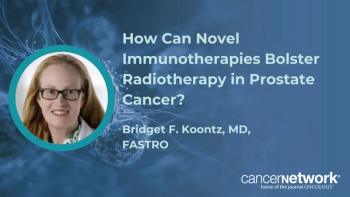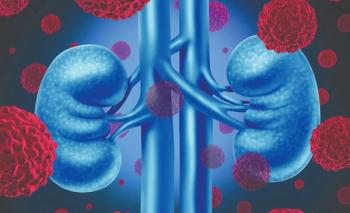
Individualized Neoantigen Therapy/Pembrolizumab Improves RFS in Melanoma
mRNA-4157 is being evaluated in combination with pembrolizumab as part of the phase 2b KEYNOTE-942/mRNA-4157-P201 trial in patients with completely resected, high-risk, stage III to IV melanoma.
Treatment with an individualized neoantigen therapeutic, mRNA-4157 (V940), plus pembrolizumab (Keytruda) resulted in an improvement in relapse-free survival (RFS) and distant metastasis-free survival (DMFS) in patients with completely resected, high-risk, stage III to IV melanoma, according to follow-up findings from the
Investigators reported that mRNA-4157 and pembrolizumab continued to demonstrate clinically meaningful RFS and DMFS benefit. They also indicated that there was a 49% reduction in risk of recurrence or death among patients treated with the combination vs pembrolizumab alone at a median follow-up of approximately 3 years (HR, 0.510; 95% CI, 0.288-0.906; one-sided nominal P = .0095). Additionally, the risk of distant metastases or death was reduced by 62% in the experimental arm compared with the control arm (HR, 0.384; 95% CI, 0.172-0.858; one-sided nominal P = .0077).
The safety profile for mRNA-4157 appears consistent with previous reports. A rate of grade 3 treatment-related adverse effects (TRAEs) in the combination arm was 25% compared with 20% in the pembrolizumab monotherapy arm. The most common any-grade AEs associated with mRNA-4157 were fatigue (60.6%), injection site pain (56.7%), and chills (49.0)%.
“As we continue to follow participants in the KEYNOTE-942/mRNA-4157-P201 study, we are excited to see such a robust clinical benefit with mRNA-4157 (V940) as adjuvant treatment in combination with [pembrolizumab] in people with resected high-risk melanoma,” Kyle Holen, MD, senior vice president and head of development of Therapeutics and Oncology at Moderna, said in the press release.
“These data add another positive analysis to the multiple end points and subgroups previously assessed in this study. Importantly for this technology, the KEYNOTE-942/mRNA-4157-P201 study was the first demonstration of efficacy for an investigational mRNA cancer treatment in a randomized clinical trial and the first combination therapy to show a significant benefit over [pembrolizumab] alone in adjuvant melanoma. We look forward to sharing these data with people impacted by this disease and the broader scientific community.”
The novel, investigational mRNA-based individualized neoantigen therapy is comprised of synthetic mRNA coding for up to 34 neoantigens; the treatment is designed and produced from the individual mutational signature of a patient’s tumor DNA sequence. After the treatment is given, the RNA-encoded neoantigen sequences are translated and undergo natural cellular processing. This class of drug is designed to cause an antitumor immune response via specific T-cell responses based on the individual tumor signature. Additionally, pembrolizumab increases the potential of the immune system’s ability to identify and kill tumor cells.
The randomized, open-label phase 2b KEYNOTE-942 study included a total of 157 patients who had been diagnosed with high-risk, stage III/IV melanoma. Patients were randomly assigned 2:1 to either the mRNA-4157 arm or pembrolizumab arm following complete resection. Those in the experimental arm were treated with 1 mg of mRNA-4157 every 3 weeks for 9 doses plus 200 mg of pembrolizumab every 3 weeks for up to 18 cycles while the control group received pembrolizumab alone until disease recurrence or unacceptable toxicity.
The study’s primary end point was RFS, with key secondary end points including DMFS and safety. Distribution of tumor mutational burden expression at baseline across both cohorts, as well as its association with RFS, acted as an exploratory end point.
Reference
Moderna and Merck announce mRNA-4157 (V940) in combination with Keytruda(R) (pembrolizumab) demonstrated continued improvement in recurrence-free survival and distant metastasis-free survival in patients with high-risk stage III/IV melanoma following complete resection versus Keytruda at three years. News release. Moderna. December 14, 2023. Accessed December 18, 2023. https://bit.ly/482xbK3
Newsletter
Stay up to date on recent advances in the multidisciplinary approach to cancer.



















































